The Apple iPad Air 2 Review
by Joshua Ho on November 7, 2014 9:30 AM EST- Posted in
- Tablets
- Apple
- Mobile
- iOS
- ipad Air 2
CPU Performance
Now that we’ve managed to take a good look at the changes between the A8 and A8X, we can get a good idea of what those differences translate to in some real world performance. While we’ve already seen pure CPU performance, such differences can be small when viewed from real applications. To this end, we use a few browser benchmarks and similar benchmarks. I definitely want to caution against comparing SoCs across platforms though, as rendering engines have a significant effect upon the performance of the device.
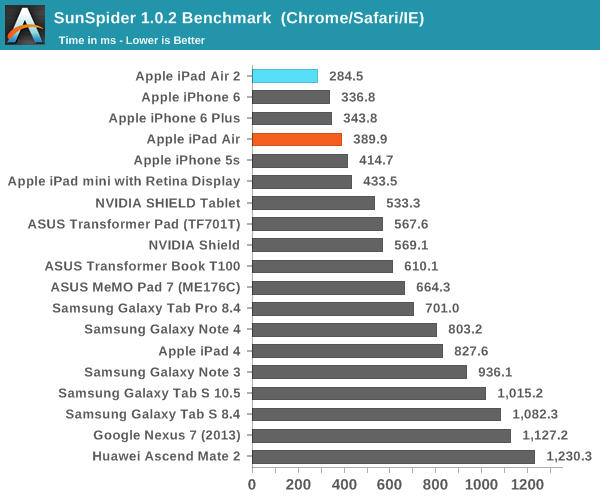
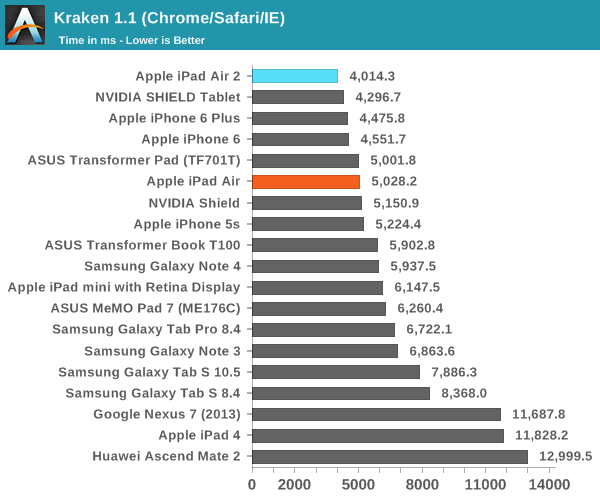
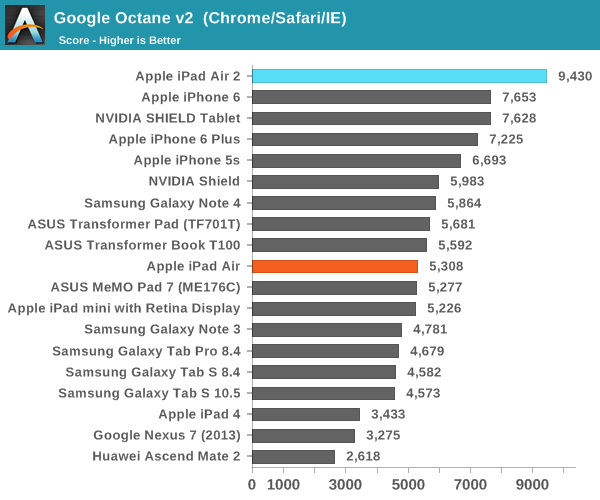
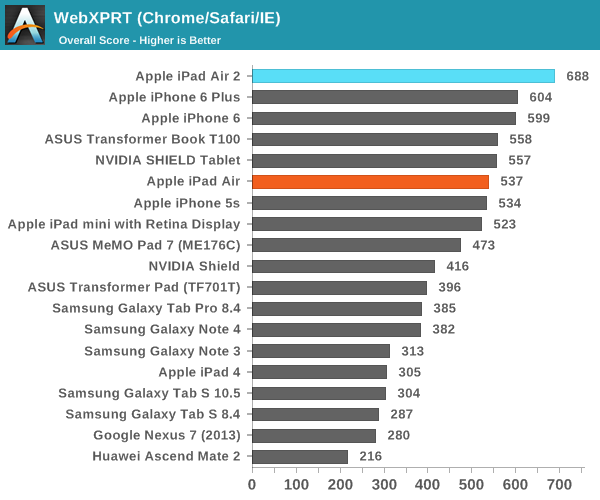
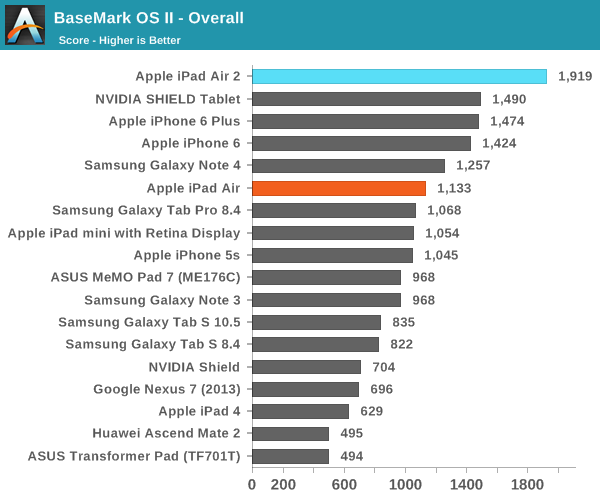
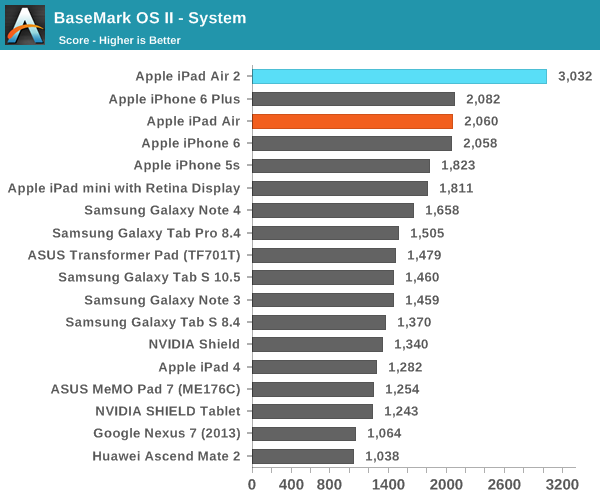
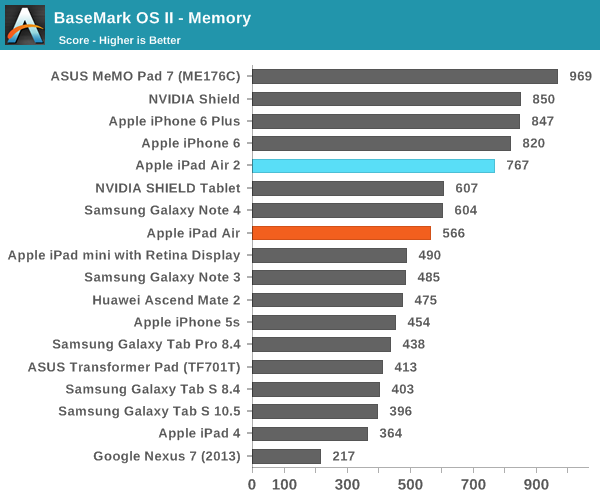
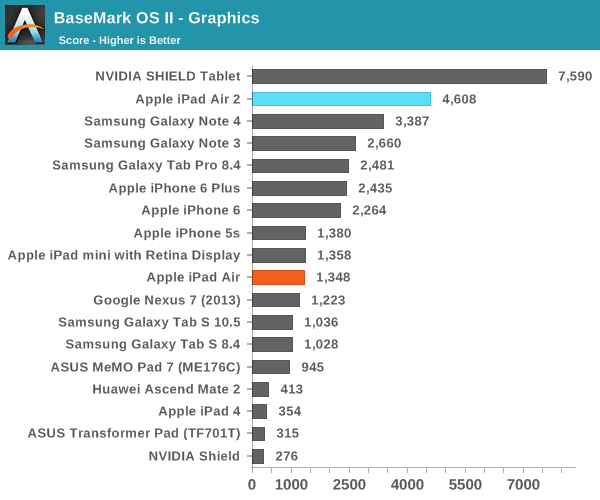
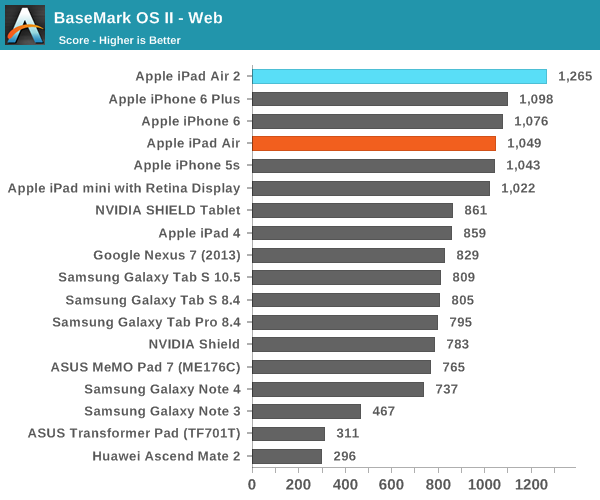
There's really not too much that needs to be said here, as the extra core and minor clock speed bump make for ridiculous amounts of performance. The A8X is class-leading here despite generally having fewer cores and lower clocks than the rest of the competition. However, in comparison to A8 we don't see a massive jump in performance. This seems to suggest that even a third core will invoke diminishing returns in general, although these changes mean that it's enough for the iPad Air 2 to be one of the fastest ARM-based devices on the market. One can see an odd regression in the Basemark OS II storage test, but this is likely to be production variances in NAND quality rather than anything notable.










226 Comments
View All Comments
DosOldie - Sunday, November 9, 2014 - link
I still have an iPad 2 and I do not plan on upgrading my iPad until there is add on space. Put in a usable SD slot and I' ll upgrade. Adding & deleting apps will not change w a new iPad w the same amt of space.ws3 - Wednesday, November 12, 2014 - link
So you will never be upgrading...tralalalalalala40 - Thursday, November 13, 2014 - link
See the iStick... You see. everything is going wireless. They have wireless HDs from toshiba that are for the iPad now. You don't need a random dust collecting/battery dwindling port to get done what you want to get done.sdagley - Monday, November 10, 2014 - link
The line "I’m not necessarily sold on TouchID on a tablet as an ergonomic ideal as the sheer width of the device makes it a bit harder than usual to properly place my finger for scanning" in the Final Words section doesn't make sense. The TouchID sensor works with multiple fingers at any any orientation which makes it easy to use no matter how you're holding it. This review makes it sound like Apple uses the old style vertical swipe sensor like the Galaxy S5 usesLgFriess - Monday, November 10, 2014 - link
Just picked up an Air 2 over the weekend. I'm no Apple fan boy (PC gamer, Note 3 phone and don't think I'll ever go back to an iphone, and I generally despise itunes) , I just wanted what I thought would work best for me. After agonizing for months over every tablet out there including the Nexus 9, I just liked the Air 2.The cons (since that's what everybody seems interested in);
1. It's almost too thin. It feels delicate to me. I'd much rather have a bit thicker tablet with a more substantial feel. Stop with the thin thin thinner crap. Of course I have a case on the way but still.
2. The vibration. Yep it's definitely there. However, I can't think of any situation that this would bother me in the least bit. I wouldn't have thought to mention it but I saw so many comments here saying it's worse then ebola. There is no way somebodies fingers are going numb when holding it. People are starting to make up things to enforce their argument. The vibration certainly goes back to problem 1. Too thin, too light, too delicate in the hand.
3. Speakers. Not that I'm expecting anything great on a tablet but I sure like the thought of the Nexus front facing speakers. It's just a better solution. The ipad speakers aren't bad at all. They're just typical tablet speakers.
All in all, it's been a great addition. Fast, smooth, great apps (just tried Hearthstone for the first time, and as a PC gamer, I'd say it makes a great tablet game which I generally can't stand), display is gorgeous, battery life is longer then expected though gaming will eat it up quickly. The fingerprint ID thing IS nice, which surprises me as I wouldn't have thought I would care.
Very happy with my purchase.
LgFriess - Monday, November 10, 2014 - link
One other thing. There is absolutely NO distortion just holding the tablet. Another instance of over dramatization. I've put a little pressure into the back and didn't notice any distortion in that case either, but as I've said above, I do feel it's too thin/delicate and I'm afraid I'll damage it if I were to squeeze it too much. By "too much" I mean actively trying to bend it to see if the screen will distort, but not under normal use.tralalalalalala40 - Thursday, November 13, 2014 - link
When I pile-drive my LCD monitors at work they distort so I took them back.yhselp - Monday, November 10, 2014 - link
It's worth mentioning that this is the first handheld device (apart from full-fledged Windows tablets) truly close to last-gen gaming consoles in terms of performance - 25.6 GB/s memory bandwidth and a powerful triple-core CPU. It'd be interesting to see how the 1.5 GHz enhanced Cyclone stacks against the 3.2 GHz PowerPC in the Xbox 360.spammy39 - Tuesday, November 11, 2014 - link
Is there any reason why Anandtech does not include the Surface Pro 3 on the benchmark list?Fairshare - Wednesday, November 12, 2014 - link
Do you see any Intel Core based tablets here? The Surface Pro 3 is a PC that just happens to be a tablet so it's not really comparable in terms of performance. You might compare other statistics such as battery, display etc. but it's otherwise a completely different animal.